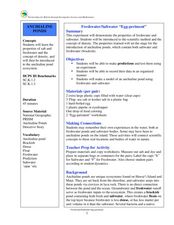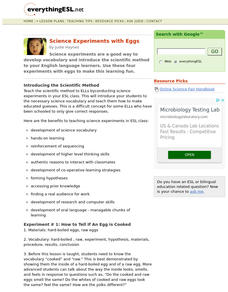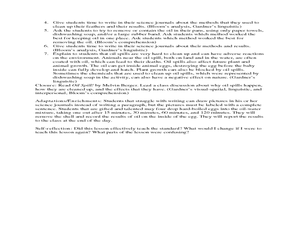Curated OER
How to Float an Egg
Use the scientific method to experiment with an egg. Your class can examine buoyancy and density by finding how many spoons of salt are needed to float an egg. They can predict, experiment, record data, and analyze results.
Curated OER
Science Egg Experiment
Students examine and hypothesize about hard cooked and raw eggs before experimenting to see which one cracks more easily when dropped in a bucket. They open both eggs and compare them using a Venn diagram. They design a presentation...
Scholastic
Lesson Four: The Earth, Layers of Earth
Get your hands dirty with a set of earth science activities! Class members delve into a hard-boiled egg to find the similarities to the earth's layers, create a papier-mâché model of the earth, craft a simulation of the earth's...
Curated OER
Freshwater/Saltwater "Eggs-Periment"
Students explore water properties by conducting a class experiment. In this buoyancy lesson, students utilize freshwater, saltwater, plastic cups, hard boiled eggs and food coloring to experiment with the floating capabilities of salt...
Workforce Solutions
Egg-streme Sports
Challenge small groups to build a structure that catches a raw egg without breaking—working collaboratively and applying mathematical and engineering principles. Pretending the frame was made by a business, scholars create a marketing...
Curated OER
"Egg-citing" Science!: Experiments Using Eggs
You can use these "eggs-traordinary" hands on lesson plans to get students engaged in science.
Curated OER
Plate Tectonics: An "Eggs"periment
Students investigate plate tectonics by observing a cracked egg shell. In this Earth science lesson, students draw borders of continents on an egg shell, only to watch it crack in a glass. Students record the breakup of the...
Curated OER
Science Experiment With Eggs
Students participate in four scientific experiments with eggs. They discuss egg vocabulary, and examine the eggs' attributes through the experiments. They focus on making educated guesses.
Curated OER
What Came First, the Chicken or the Egg?
Students explore the concept of nutrition. In this nutrition lesson, students identify the benefit of eggs as a nutritional meal or snack. Students also discover how to prepare easy meals or snacks using eggs.
Curated OER
"Eggs-perimenting" Fun
Students dissolve salt into water, place an egg into a glass of salt water, observe and record observations, make a scientific hypothesis, summarize what they studied from this hands-on experiment. They share their ideas and findings...
Curated OER
AIR PRESSURE
Sixth graders identify air pressure and how it affects objects. They experiment with one hard boiled egg in a bottle and the affects of air pressure on the egg.
Curated OER
Cleaning an Oil Spill
Third graders use oil, feathers, eggs, rubber bands, and more to create a simulated oil spill and then clean it up. In this oil spill lesson plan, 3rd graders discuss what their cleaning process is like and how the oceans are effected...
Curated OER
Will It Sink or Float?
Learners conduct a science experiment to determine whether a variety of objects will sink or float. They discuss the concept of density, and then make predictions about whether the objects will sink or float. They then conduct the...
Weebly
Definitions of Conduction, Convection, and Radiation
There's quite a bit in this physical science packet. First, how is heat transferred? Learners read a brief explanation of conduction, convection, and radiation before identifying common occurrences (with pictures) as one of the three....
Curated OER
Soak it up
Learners complete a hands on activity using hard boiled eggs, food coloring, tape, cups, water, and a knife to show how permeability affects animals. In this permeability lesson plan, students complete this activity and learn how...
Curated OER
What Are The Properties of Sea Water?
Ninth graders conduct research on the subject of sea water. They use a variety of resources to obtain information. There are helpful resource links listed in the lesson. In conjunction with the research students make inquiry of the...
Curated OER
Air Has Pressure
Seventh graders analyze evidence about particles and the exertion of air pressure. They observe an experiment with a hard boiled egg. fire and a bottle to discover the heating, cooling, and speed of air particles. They write explanations...
Curated OER
Science Experiments with Eggs
ESL students experiment with eggs to learn the science concepts and science process language.
Curated OER
Crash Test Dummies
Fifth graders are introduced to Newton's First Law of Motion. In groups, they describe the differences between balanced and unbalanced forces. They participate in experiments that demonstrate how equal and opposite forces act upon...
Curated OER
To Float or Not to Float - Density
Students experiment floating a variety of objects in various liquids. They discover how density affects the ability of an object to float and apply the concept of density to solve problems.
Curated OER
Marine Habitats of Galveston Island
Four lessons introduce elementary ecologists to salt marsh and sandy beach habitats. In the first lesson, they place shells and other materials in vinegar to determine if they contain calcium carbonate. In the second lesson, they read a...
Curated OER
Protein Coagulation or Denaturation
For this proteins worksheet, learners compare the coagulation of egg whites and milk proteins and then complete 5 short answer questions. A protein coagulation quiz is also included with 5 multiple choice questions.
Curated OER
Plate Tectonics
Young scholars participate in a series of experiments to learn about plate tectonics and the different materials of the Earth. In this plate tectonics lesson plan, students use eggs, water, beakers, paper, and more materials to learn...
Curated OER
Playground Safety
Students conduct experiments with fruit falling from playground equipment to explain the effects of falling off playground equipment.

























